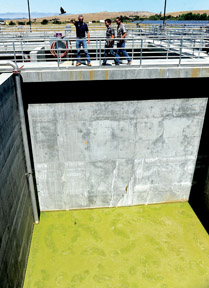A representative of a water resources conservation group in Mexico this week visited San Benito County on a two-day, fact-finding mission to learn about local water-saving programs.
Gabriel Patron Coppel of the group Niparaja in La Paz, Baja California, was shown around by Shawn Novack, the county’s water conservation program manager.
“Being in a desert region, water is a concern” in La Paz, where Novack owns a vacation home. “A lot of the water issues they have, we’re dealing with, such as water supply and quality. Water is an international issue.”
On Wednesday, Novack brought Coppel to the water treatment plant on Fairview Road and accompanied him on a tour of the wastewater treatment plant on Hollister’s east side later in the morning.
Dennis Rose, supervisor of the city’s wastewater and reclamation efforts, showed Coppel the workings of the plant, which has been online for three years. In addition to showing how the plant treated water and where it was sent for percolation or for irrigation, Rose noted how the city hopes to eventually provide its treated water to local farmers, but said that the agricultural community has been reticent about using the source while they still have access to plentiful and relatively inexpensive sources elsewhere.
“When that becomes unavailable, they’ll become interested in our water,” he said.
For now, Hollister’s treated water is either percolated to underground aquifers near the San Benito River or sprayed at city-owned grassy land near the Hollister Airport and on a 50-acre parcel just east of the river on the city’s east side.
During his time in Mexico, Novack began talking with Niparaja, a natural resources conservation group, about water conservation measures. A fellowship from the International Community Foundation funded Coppel’s visit, which also included a trip to the Monterey County Water Management District to learn about saltwater intrusion to the water supply as well as a trip to the Romero Visitors’ Center at San Luis Reservoir.
“They could have picked any water district in the state, and they picked us, which is an honor,” Novack said.
Coppel, who studied electronics and communications engineering in Mexico and has a master’s degree in water administration, has also worked in Spain and Mozambique doing research on natural technologies for water treatment.
“He’s mainly trying to gather as much information as he can get,” Novack said.
Coppel said he was hoping to get “a helicopter view of how they do things here.”
“In Mexico we have the water utility and the federal government; nothing to this detail,” he said. “We’re trying to learn how we can save water as well as learn more about infiltration and capturing rain. We have a shortage of water where I come from. It’s the driest state in Mexico. It’s nice to see how we can save money and save water.”
Coppel said he will do a presentation when he returns to Mexico to share his new-found knowledge.









